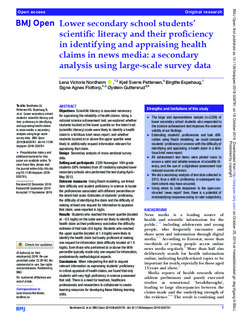Lower secondary school students’ scientific literacy and their proficiency in identifying and appraising health claims in news media: a secondary analysis using large-scale survey data
Nordheim, Lena Victoria; Pettersen, Kjell Sverre; Espehaug, Birgitte; Flottorp, Signe Agnes; Guttersrud, Øystein
Journal article, Peer reviewed
Permanent lenke
http://hdl.handle.net/11250/2624374Utgivelsesdato
2019Metadata
Vis full innførselSamlinger
- Import fra CRIStin [3604]
- Senter for kunnskapsbasert praksis [94]
Originalversjon
Nordheim, L. V., Pettersen, K. S., Espehaug, B., Flottorp, S. A. & Guttersrud, Ø. (2019). Lower secondary school students’ scientific literacy and their proficiency in identifying and appraising health claims in news media: a secondary analysis using large-scale survey data. BMJ Open, 9(10). 10.1136/bmjopen-2018-028781Sammendrag
Objectives: Scientific literacy is assumed necessary for appraising the reliability of health claims. Using a national science achievement test, we explored whether students located at the lower quartile on the latent trait (scientific literacy) scale were likely to identify a health claim in a fictitious brief news report, and whether students located at or above the upper quartile were likely to additionally request information relevant for appraising that claim. Design: Secondary analysis of cross-sectional survey data. Setting and participants: 2229 Norwegian 10th grade students (50% females) from 97 randomly sampled lower secondary schools who performed the test during April– May 2013. Outcome measures: Using Rasch modelling, we linked item difficulty and student proficiency in science to locate the proficiencies associated with different percentiles on the latent trait scale. Estimates of students’ proficiency, the difficulty of identifying the claim and the difficulty of making at least one request for information to appraise that claim, were reported in logits. Results: Students who reached the lower quartile (located at −0.5 logits) on the scale were not likely to identify the health claim as their proficiency was below the difficulty estimate of that task (0.0 logits). Students who reached the upper quartile (located at 1.4 logits) were likely to identify the health claim but barely proficient at making one request for information (task difficulty located at 1.5 logits). Even those who performed at or above the 90th percentile typically made only one request for information, predominantly methodological aspects. Conclusions: When interpreting the skill to request relevant information as expressing students’ proficiency in critical appraisal of health claims, we found that only students with very high proficiency in science possessed that skill. There is a need for teachers, healthcare professionals and researchers to collaborate to create learning resources for developing these lifelong learning skills.

